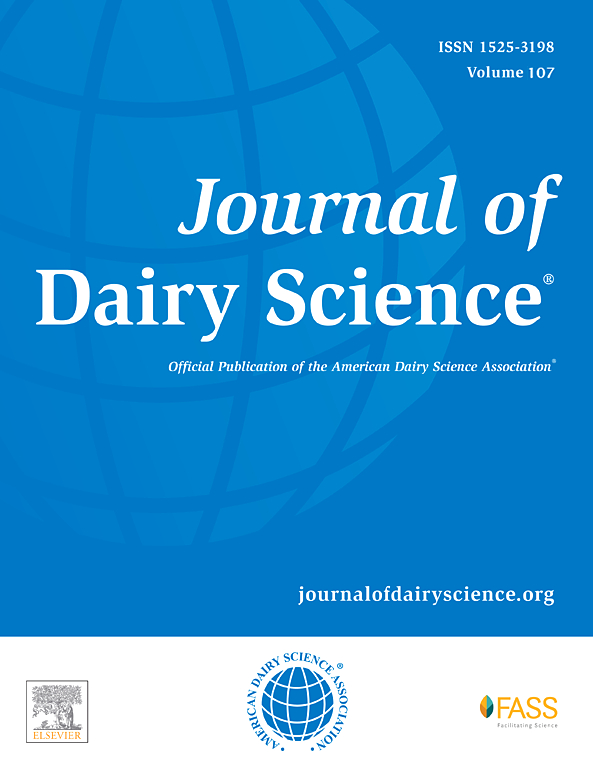Identification of proteolytic bacteria from Yunnan fermented foods and their use to reduce the allergenicity of β-lactoglobulin
IF 3.7
1区 农林科学
Q1 AGRICULTURE, DAIRY & ANIMAL SCIENCE
引用次数: 0
Abstract
Beta-lactoglobulin is considered to be the major allergenic protein in milk. Lactic acid bacteria (LAB) possess a protein hydrolysis system that holds great promise for hydrolyzing β-LG and reducing its allergenicity. Therefore, this study aimed to screen LAB with β-LG hydrolysis activity from Yunnan traditional fermented foods. The results showed that Pediococcus pentosaceus C1001, Pediococcus acidilactici E1601–1, and Lactobacillus paracasei E1601–2 could effectively hydrolyze β-LG and further reduce its sensitization (more than 40%). All 3 LAB hydrolyzed β-LG allergenic fragments V41–K60 and L149–I162. Moreover, they encode a variety of genes related to proteolysis, such as aminopeptidase pepC and pepN, proline peptidase pepIP and endopeptidase pepO; L. paracasei also E1601–2 contains extracellular protease coding gene prtP. They also encode a variety of genes associated with hydrolyzed proteins. The 3 strains screened in this study can be used to develop hypoallergenic dairy products.
云南发酵食品中蛋白水解菌的鉴定及其在降低β-乳球蛋白过敏性中的应用
β-乳球蛋白(β-LG)被认为是牛奶中主要的致敏蛋白质。乳酸菌(LAB)具有蛋白水解系统,有望水解β-LG,降低其过敏性。因此,本研究旨在从云南传统发酵食品中筛选具有β-LG水解活性的乳酸菌。结果表明,Pediococcus pentosaceus C1001、Pediococcus acidilactici E1601-1和Lactobacillus paracasei E1601-2能有效水解β-LG,并进一步降低其致敏性(40%以上)。这三种乳酸菌都能水解β-LG致敏片段V41-K60和L149-I162。此外,它们还编码了多种与蛋白水解有关的基因,如氨基肽酶 pepC 和 pepN、脯氨酸肽酶 pepIP 和内肽酶 pepO,而准杆菌 E1601-2 含有胞外蛋白酶编码基因 prtP。它们编码多种与水解蛋白相关的基因。本研究筛选的 3 种菌株可用于开发低过敏性乳制品。
本文章由计算机程序翻译,如有差异,请以英文原文为准。
求助全文
约1分钟内获得全文
求助全文
来源期刊

Journal of Dairy Science
农林科学-奶制品与动物科学
CiteScore
7.90
自引率
17.10%
发文量
784
审稿时长
4.2 months
期刊介绍:
The official journal of the American Dairy Science Association®, Journal of Dairy Science® (JDS) is the leading peer-reviewed general dairy research journal in the world. JDS readers represent education, industry, and government agencies in more than 70 countries with interests in biochemistry, breeding, economics, engineering, environment, food science, genetics, microbiology, nutrition, pathology, physiology, processing, public health, quality assurance, and sanitation.
 求助内容:
求助内容: 应助结果提醒方式:
应助结果提醒方式:


